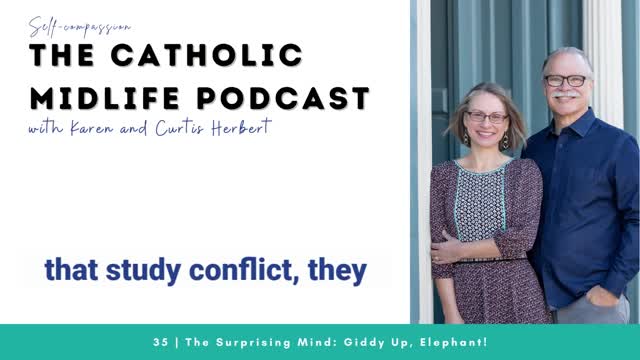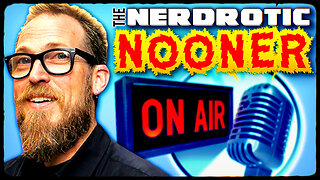Premium Only Content

Episode 35 - The Surprising Mind: Giddy Up, Elephant!
We are going to share a metaphor with you about how your mind works and suggest a couple of ways for you to manage yourself with more grace.
The ancients knew that teaching wisdom involved touching the heart and the mind. Here are a couple of examples: “It is better to obey the Lord and to have only a little than to be very rich and terribly anxious.” And “Blessed are the poor in spirit for theirs is the kingdom of heaven.”
Modern minds are so deeply enmeshed in scientific materialism that we're not even aware of it. It colors everything we do. Scientists reduce complex phenomena to know the fewest possible true things - that’s scientific parsimony.
We are always boiling complexity down to a few logical, abstract concepts. It’s a reduction of reality down to abstract ideas. It's a very powerful approach.
It’s hard for you not to constantly do this.
It's also a disaster when it's used to try to understand love, God, virtue, beauty, or basically anything that's really important.
The heart helps us understand these really important things - the sorts of things that can’t be reduced to a few abstract concepts.
Our Western mindset, however, separates the “mind” and the “heart.” We want to logic our way through everything. We want the church to tell us exactly what rules to follow. (Thanks, Paul, for the law of life-in-the-spirit-of-the-messiah (Romans 8) but now let’s get down to business, so tell us exactly what law to follow)). We fall into the trap of thinking “once I have decided I will do it, I will do it because I have decided to do so.”
The Western mind likes to think of a human as being governed by an “intellect” that uses its “will” to seek the good. If we fail to achieve good, we are stupid, lazy, sinful, lack persistence, or otherwise, fail to measure up.
Man up, and go get it!!
That’s an incomplete picture.
I’m not telling you it’s a “wrong” picture. But I can tell you it’s a very crude map of who you are and how you actually work.
Here’s a better way to map this.
Think of a rider on a very large elephant.
The rider is your conscious mind, what you probably identify with as being “you.” It’s the language user, the tool user, the goal-setter, the planner, and the logical one.
The elephant is more or less everything else: it’s your unconscious mind. It’s a huge elephant – a really big one – which is the emotional brain: it’s powerful, impulsive, the source of motivation and it’s what moves us. The unconscious mind is the goal-getter.
The rider and elephant metaphor was coined by the positive psychologist Jonathan Haidt in The Happiness Hypothesis. And it’s discussed at length by Dan and Chip Heath in Switch: How to Change Things When Change Is Hard.
When the rider and the elephant are in conflict, the elephant will usually win. It’s massive and will eventually wear out the rider when it’s not really on board with what the rider has in mind.
Just because the rider wants something doesn’t mean she’s going to get it. Check-in with your elephant - get it to a good place if you want to get something done.
And don’t get mad at yourself if you don’t follow through on your plans. Instead, start asking the elephant - what’s going on? Why aren’t you on board with this?
The rider - the conscious language user - makes the PLANS. But it’s the elephant and rider TOGETHER that take action. And if the elephant’s not cooperating, the rider LOSES.
Learn how to cooperate with your elephant!
Here’s another tip: Your elephant likes specific, clear directions. I want to weigh 185 pounds by Easter, not “I want to lose weight.” The elephant wants to know exactly what to do: eat only whole foods as opposed to “eat healthily.”
Another tip: the elephant has a big, fat negativity bias. It’s always scanning for threats. When it finds one, it stops scanning, picks it up, and looks it over. Ponders it. Plays with it. What ifs with it. Swats it with its amazing trunk.
If you aren’t good at redirecting your elephant, it’s going to spend a lot of time finding negative things to toy with. Like your negative future. Or why that person is a real jerk? Or how unfair the past has been. Or the failures of your circumstances to bring you good things.
For some of these negatives, it will slip them in without you noticing, like attributing the lowest of motives to someone you are dealing with.
There are many many tips for working with the unconscious mind. We are experts in rooting out outdated perspectives and releasing pointless emotional baggage.
If you hang on to the metaphor of the elephant and rider and keep asking yourself “what’s really going on here - why am I acting this way?” then you will be ahead of the game!
Listen to the podcast for more, plus some anecdotes that illustrate.
Join our Self-Compassion Group starting November 2022
Quote from Karen in the podcast: “ The map is not the territory, and I do, I just am going to add a second thing I want people to take away, which is: it is possible to change your map at any time. It's possible. There's hope and, and we've seen this, I've seen this in my clients. It's what we do. There are techniques to shift your mental map and in the power of the Holy Spirit with the right techniques, this totally is possible. I just want people to feel hopeful about who they can be and how they can process the world, and what kinds of experiences God has for us and, and what's possible.”
Learn More:
Female: https://midlife.thmlcoaching.com/self-compassion-seeing-yourself-through-the-eyes-of-god
Male: https://midlife.thmlcoaching.com/self-compassion-toolsformen
Contact Info
Email or text us:
Text: The Catholic Midlife podcast: 612-208-9150.
Email us: TheCatholicMidlife@gmail.com
Facebook:https://www.facebook.com/groups/thecatholicmidlife
Instagram: https://www.instagram.com/thecatholicmidlife/
Website: https://thmlcoaching.com/podcast/
-
 27:50
27:50
The Empowered Catholic Podcast
19 days ago182 | What’s your style for Conflict?! | The Empowered Catholic Podcast
151 -
 LIVE
LIVE
Dr Disrespect
7 hours ago🔴LIVE - DR DISRESPECT - TRIPLE THREAT CHALLENGE - WINNING AT EVERYTHING
2,261 watching -
 1:41:06
1:41:06
vivafrei
4 hours agoTrump Changing Tune on Operation Warp Speed? CBC Promoting Propaganda? Shiloh Hendrix Update & MORE!
171K64 -
 UPCOMING
UPCOMING
SavageJayGatsby
1 hour agoLet's Play: Pacific Drive || $300 Weekly Goal - Spicy Bite Saturday || Teen Drinkin is Very Bad
1 -
 UPCOMING
UPCOMING
The Mike Schwartz Show
2 hours agoTHE MIKE SCHWARTZ SHOW Evening Edition 09-01-2025
862 -
 46:25
46:25
The Quartering
6 hours agoMeta PC Winner, Trump Ruins Libs Dark Fantasy & Raja Jackson Case Heats Up!
127K56 -
 LIVE
LIVE
Rallied
5 hours ago $4.88 earnedWarzone Challenges w/ Doc & Bob
194 watching -
 LIVE
LIVE
StoneMountain64
5 hours agoNew Missions for Battlefield 6 Unlocks (+New Mouse and Keyboard)
245 watching -
 2:09:47
2:09:47
Nerdrotic
10 hours ago $6.30 earnedHollywood's Long Dark Summer of the Soul - Nerdrotic Nooner 511
70.3K3 -
 1:36:05
1:36:05
Side Scrollers Podcast
7 hours agoStreamer ATTACKS Men Then Cries Victim + Pronoun Rant Anniversary + More | Side Scrollers
51.5K